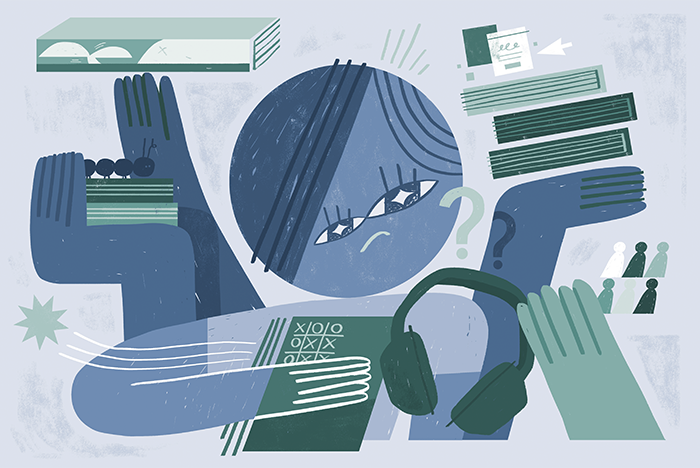- Home |
- Search Results |
- How to kickstart your reading habit for 2020
How to kickstart your reading habit for 2020
The year is new and the time is right to become your awesome – and very well-read – future self. But besides just walking into a bookshop and hoping for the best, how can you reignite your passion for reading this year? Matt Blake suggests some novel ways to get back into books.

The most magical time of the year isn’t Christmas, it’s the first few days of the New Year. The grogginess of New Year’s Eve is fading, your Christmas Spirit is dimming and the time is right to become your awesome future self. You know: that distant version of you that’s healthier, kinder, more financially responsible, and – most importantly – much better read.
Last New Year, did you set yourself a goal to read a certain number of books? Did you fail miserably? If reading has given way in your life to social media, worldly worries and other distractions, it can be hard to back in the habit. These approaches will get you back in the swing of things.
Start off with a novella
Shorter than a novel and more satisfying than a short story, novellas are the perfect way to re-invigorate your reading habits and test the water with a new writer. Hemingway's The Old Man And The Sea is a solid gateway into the genre - it won him the Nobel Prize, after all – not to mention somewhat fitting as it's about perseverance in adversity. But if men-fighting-fish-as-a-metaphor-for-life books are too sea-salty for you, there are plenty more set on dry land. Here are some of our favourites.
Listen to the Penguin Podcast
How did astronaut Tim Peake feel when he watched Star Wars in space? Why does Elif Shafak find it impossible to write without noise? And how did taking Ayahuasca in the Amazon rainforest cure Simon Amstel's depression? The Penguin Podcast answers all those questions and more. Penguin's fortnightly series hosts a glittering roll call of some of the world’s best-known authors as they discuss their lives, loves and influences – as well as five objects that have inspired their writing.
Take the plunge into audiobooks
Don't listen to the purists: you can't cheat on your eyes with your ears. You could even argue that listening to stories is a more natural state than reading – after all, humans have shared information orally far longer than we have in writing. In any case, the right narrator can really breathe fresh life into a book plus it'll shake up your routine as you ‘read’ in places you never did before, like the walk to work, at the gym or in a dark room with your eyes firmly closed. Here are some recommendations to get you started.
Read more
Go on a reading retreat
The next time you check your emails or scroll Twitter, ponder this: you devour more information in a single day than a person in the Middle Ages would have consumed in a month. No wonder you’re struggling to find the headspace for a book as well. What you may need is a reading retreat.
There are lots around, but the usefully-named Reading Retreat is a good example. A ‘fully pampered getaway in the country or by the sea’, their sole priority is to give you space and time to read. Starting from £450 per person for a 3-night stay, they'll cook for you, brew tea for you, keep sofas free for you and even offer a ‘device sitting’ service for your smartphone. They also welcome an author to join guests for dinner to discuss their latest book. Unplug, unwind and just... read.
Try a new reading technique
‘A rambler needs different techniques if she wants to climb a mountain, and the same applies to tackling big books.’ That's the counsel from Penguin Classics Editor and author Henry Eliot, in an article he wrote for this website in April about tackling the canon.
You could devise a structured reading plan that splits your time into manageable chunks, read a book alongside your partner (or other reading companion) to keep you energised through the bumps and slumps, or even read a book on location. For the latter, Eliot prescribes, among other cures, walking with a group of friends from London to Canterbury, reading and discussing Chaucer's Canterbury Tales along the way, in the same locations as each is told. Or if you really want to treat yourself, how about Paris?
#AskPenguin
Looking for a zombie comedy that tackles climate change? Or a romantic thriller set in a submarine? How about a pastoral whodunnit that ends with a kiss? Use the #AskPenguin hashtag on Twitter to make a request before midday, and Penguin's dedicated team of book bods will send you a personalised reading recommendation based on your mood, the theme you're interested in or other books you've enjoyed. If it exists, then Penguin will find it. And if it doesn't, they'll find you something close.
Start a book club
Listen, book clubs don’t have to be dull echoes of your last English Literature class. They can be fun. They can be edgy. They can even involve alcohol. They can basically be whatever you want them to be, so long as you have friends, a kitchen table and a bounty of snacks and wine.
You could theme them, like only allowing sci-fi books, or ones recommended only by the African American Literature Book Club. How about a bilingual book club (you'd need to agree on a language in which to discuss, of course)? You can do them in pubs, front rooms, parks, picnic areas or a haunted house if you like. A fun option is to switch up the location based on where each book is set – easiest to do in a large city, of course, but it could be as simple as books set in parks, or on farms, or in fairgrounds.
For some, book clubs are an excuse to read something they never would on their own; for others it’s the chance to climb between the lines of a book by bouncing around ideas. And for you, dear reading slumpee, it'll force you back into reading by way of the most motivating of all British fears: embarrassment.

Leap into a genre you've always avoided
Whether its detective fiction, dystopian sci-fi or psychedelic mis-lit, everyone has a genre they’ve always neglected through a vague sense it’s ‘not for them’. But in truth, every genre has its classics and taking a shot on something completely new is a surefire way to rejuvenate your reading habits. Let’s call it a mind holiday. If you really feel you've exhausted all the ‘big’ genres, how about some cli-fi (novels about climate change), Twitterature (books written entirely through the medium of Twitter), or spoetry (poems composed from the subject lines of spam emails)? And if you've even covered those, well... there's always the dictionary.
Use Penguin's ‘Where To Start’ series
Is there a writer you've always wanted to get into but have never quite known where to begin? Our ‘Where To Start’ series will take you gently by the shoulders and shake the indecision out of you. From Jane Austen to Jaqueline Wilson, Charles Dickens to Eric Carle, Vita Sackville-West to The Worst Witch, we've compiled the perfect gateway reading lists so you don't have to.
Book bingo
When reading begins to feel like a chore, find a way of making it feel like a game. That's good life advice in general, but we're talking about books here and with books you can do bingo! Download a book bingo card from a variety of online sites like this one, or make your own. It's better to do with friends, or ask your local library if they host a game. Categories could include anything from 'a banned book' to 'a book you can read in a day' to 'sea creatures on cover' to 'dystopian sci-fi that lampoons religion, Brexit or both'. It'll stretch your book boundaries, and help with your pesky indecision.
Read a book about books
There is one final cure, to be prescribed only in the most chronic cases of literary indigestion: try a book about reading. Just like a cookbook can make you water at the mouth, these can, for the recovering reader, fan the embers of an old passion.
Anne Fadiman's Ex Libris: Confessions of a Common Reader is a beautiful collection of essays that recount a lifelong obsession with stories and language. Then there's Howards End is on the Landing: A Year of Reading from Home in which Susan Hill embarks on a year-long voyage to re-read all the books in her home. Ray Bradbury's Fahrenheit 451 is about a future society where books are banned, and David Whitehouse's The Mobile Library is a sweet story about love, books and the love of books. And all A. S. Byatt's books are infused with her infectious enthusiasm for all things literary. In short, there is no better way to recover your appetite for reading than to share in someone else’s passion. You’ll be back in your comfy chair and raring to go again in no time.